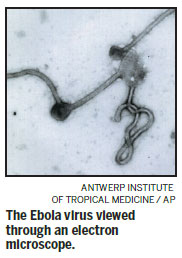Asia on outbreak alert with thermal cameras
Asian nations are using thermal-imaging cameras and posting doctors at airports to screen sick travelers, as health authorities scramble to avert a widening of the Ebola virus outbreak that has killed almost 1,000 people in West Africa.
There have been no confirmed cases of the virus in Asia, but health authorities who have battled deadly viruses in recent years - bird flu and severe acute respiratory syndrome - were dusting off drills used in those outbreaks.
Measures included infrared thermal-imaging cameras to screen air travelers with fevers, as well as public awareness campaigns. Most countries have told citizens to consider postponing travel to affected areas.
Asia's efforts to screen visitors are adequate, said Tarik Jasarevic, a World Health Organization spokesman based in Geneva.
"As long as a person is not visibly sick, we think it's fine for them to be in public," he told Reuters by telephone. "We consider the risk for international spread quite low. Measures the countries in Asia have taken are appropriate."

Health officials in Thailand, which received a record 26.5 million tourists last year, are monitoring 21 visitors from Sierra Leone, Liberia and Guinea. The officials said they had no plans to quarantine the visitors.
"They are free to move but we are checking on them frequently," said Opart Karnkawinpong, a disease-control official at Thailand's Ministry of Public Health.
"We have surveillance cameras in place at major entry points and doctors at international airports to supplement existing teams."
The Ebola virus is transmitted through contact with the body fluids of an infected person. Symptoms initially include muscle pains and joint aches, then worsen to vomiting, diarrhea and then, in the final stages, to internal and external bleeding.
India, which has nearly 45,000 citizens living and working in the four affected countries, said it would screen travelers passing through, or starting journeys there, on their return.
"The surveillance system would be geared up to track these travelers for four weeks and detect them early, in case they develop symptoms," Health Minister Harsh Vardhan told parliament on Wednesday.
(China Daily 08/09/2014 page12)














